POET SPOTLIGHT: Jamie Cooper
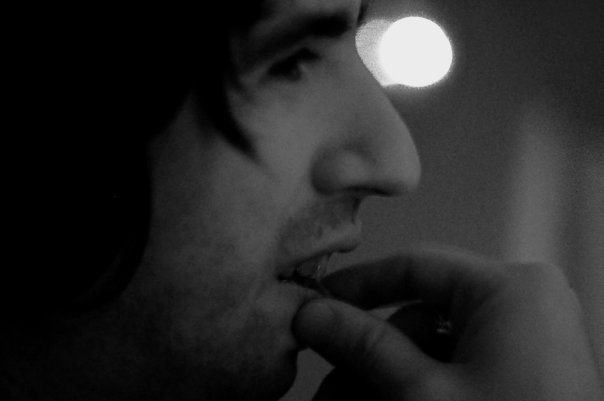
By Kody Ford
Edtior
Jamie Cooper knew he wanted to write poetry in junior high. While many angst-ridden teens write “poetry” to ease the pain of being grounded or not sitting at the lunch table with the cool kids, Jamie discovered the art after a class assignment in English in which the students were required to write a poem based upon “The Raven” by Edgar Allan Poe. The teacher loved Jamie’s piece and had proclaimed to the entire class that Jamie would grow up to become a poet. This didn’t exactly help him get to the cool kids table at lunch.
In high school, he fulfilled her prophesy and wrote what he described as “cringe-inducing” poetry. Describing this period of his life, Jamie said, “I was at that when I clung to obscure music and culture as a means of establishing my identity as a person. Of course, in hindsight, it’s embarrassing how typical a trajectory it is.”
Like all good origin tales of poets, a girl became involved. One lovely young lady sent Jamie poems by e.e. cummings. These works had such a profound affect on him that he held onto them even to this day. He keeps them in a shoebox in his closet. The impact of the discovery went beyond rampant teenage hormones. Something about the poems changed him and sent him on a path that lead to the University of Central Arkansas and eventually The Writers Workshop at the University of Iowa.
Today, Jamie lives in Portland with his wife Nicole Zdeb. The Idle Class recently interviewed Jamie to discuss his craft.
Kody: When you discovered poetry, what was it that really spoke to you?
Jamie: I once attended a seminar with the poet D.A. Powell who said that poetry was the first thing that ever really touched him at his core, that in the midst of all the cultural noise around us that poetry was the first thing that really grabbed him by the collar and said “Hey! I’m talking to you!” It’s a difficult sensation to describe, but no other art form affects me as a person on such a fundamental level the way poetry does, not even music.
Kody: Describe your early poems to me (themes, structure, etc.).
Jamie: I think a lot of what I was doing as a young writer was more or less developing my voice. One of my professors once said I was very “voicey,” which I now realize was meant as a sort of backhanded compliment. I had worked hard early on to craft a distinct voice in my poems, which ironically ended up becoming something of a hindrance to real growth. I was also very preoccupied with perception. I was practicing looking at the world in a certain way or trying to recreate the world through language. I was trying to come up with images that were surprising or startling in some way, which also sort of turned into the lazy practice of simply trying to say something clever, so there was a difficult balance to find. Other than that, I wanted a certain energy to permeate the poem, something intangible that elevated it to something more than the sum of its parts. It all sounds so lofty and abstract that it’s embarrassing. I relied too heavily on the use of similes for imagery and on the use of alliteration and assonance to create lyricism. Both things I’ve had to wean myself off of over the years.
As far as what they were “about,” it’s hard to remember. Typical stuff, I’m sure.
Kody: How have you evolved as a poet over the years?
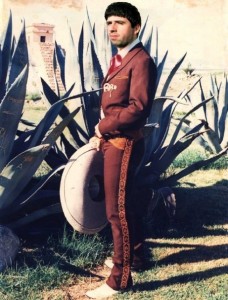 Jamie: I’d like to think I’m more “mature” now, as obnoxious as that sounds. When I was younger, my favorite topic was myself, which I think is something most writers are guilty of early on. My experiences, my way of looking at the world, what I considered was my totally unique perspective, etc. I also think in some ways I was rewriting the same poem over and over. At 20, you don’t really have a great deal of wisdom, so you write about what you know, and you inevitably drain your already limited resources and revert back to some of the things I mentioned earlier. I also don’t think I had read enough by that point to have a good gauge of the possibilities of poetry, what’s already been done, and what I could maybe build on. I had a handful of writers who I really admired and who I used as my main sources of inspiration and whose styles I tried to mimic. I’ve discovered many more poets and a wider range of poetic possibilities, so I think that has naturally helped me to evolve.
Jamie: I’d like to think I’m more “mature” now, as obnoxious as that sounds. When I was younger, my favorite topic was myself, which I think is something most writers are guilty of early on. My experiences, my way of looking at the world, what I considered was my totally unique perspective, etc. I also think in some ways I was rewriting the same poem over and over. At 20, you don’t really have a great deal of wisdom, so you write about what you know, and you inevitably drain your already limited resources and revert back to some of the things I mentioned earlier. I also don’t think I had read enough by that point to have a good gauge of the possibilities of poetry, what’s already been done, and what I could maybe build on. I had a handful of writers who I really admired and who I used as my main sources of inspiration and whose styles I tried to mimic. I’ve discovered many more poets and a wider range of poetic possibilities, so I think that has naturally helped me to evolve.
Kody: What made you want to apply to Iowa and how did you feel when you got accepted?
Jamie: It was mostly about the history and prestige of the program, the fact that so many successful writers and so many writers I’d admired had been through the program and/or taught at the program. I also had a great deal of encouragement from a few professors who gave me confidence, who saw potential in my work, and who informed me that I could potentially get accepted into a good program, and those undergraduate creative writing courses definitely helped prepare me for the workshop setting. So I applied to Iowa, and it was the only place I applied. I went for broke. I didn’t really have an alternate plan, so I’m grateful it worked out. It was very surreal when I found out I got accepted. It felt like a dream. Then I got very nervous. I was extraordinarily intimidated by the whole thing. I also found out I would be teaching, which is something I had never done before nor had ever particularly wanted to do, and I was terrified of that as well. So I basically spent the entire summer after my senior year in a state of denial, and then I had a bit of nervous breakdown right before I left and came this close to backing out of it at the last second. Better living through chemistry allowed me to make it through the first semester.
Kody: What were some of the most important things that occurred when you studied at Iowa?
Jamie: Well, I met my wife there, so that was probably the most important thing that happened to me on a personal level. But obviously I’d like to think I experienced a great deal of growth as a writer and as a person. I was awfully young and immature still at 22. I had pretty much wasted the entire summer following my senior staying zonked out with my friends. I was burnt out on school, and I wasn’t in the right frame of mind. I started having panic attacks and exhibiting some obsessive/compulsive behaviors and whatnot. I remember spending like two full weeks in bed recovering before I moved to Iowa.
The reality of the Writer’s Workshop was overwhelming, to say the least. There was like me and one other kid from below the Mason Dixon line. Everyone else was from Ivy League schools on the East and West Coasts or otherwise equally impressive collegiate backgrounds. Some of the poetry students already had books published, and many of the fiction students were clamoring to secure representation from agents and having things published in high profile publications. As I mentioned before, I was also simultaneously doing my indentured servitude as a composition instructor, which ended up occupying the majority of my time because of how ill-prepared I was to teach a college course.
This is all to say that basically I had to grow up quickly and start taking things seriously.
Kody: You’re very experimental in your approach to poetry, both in the written form and occasionally the visual form (I’m thinking of the pieces you sent with the Beckett lines on various pictures). What is it that you love about being experimental? What are some of your favorite experiments with poetry?
Jamie: My favorites are the ones that more or less take on a life of their own and evolve with their own organic structure with me acting as more of a conduit than an active participant. Those are the most fun to write, the ones that feel effortless, the ones where you feel like your tapped into something else. I just really enjoy the process of finding the connections in language and discovering what’s possible. That’s the most exciting and gratifying aspect of writing to me.
With the Beckett visual poems, I was reading an old paperback copy of Maloy, Malone Dies, and The Unnamable, and it was literally falling apart page by page, and I had some old science textbooks and National Geographics laying around in my office, so I started cutting out individual lines that kind of jumped out at me, from each of the three novels, and re-appropriating the lines to create little poems that I pasted on various visual backgrounds. It was totally inspired by Brandon Downing’s collection Lake Antiquity. The process was a great deal of fun, and it was interesting to see how the different individual lines spoke to one another across the three novels, and how those lines and the ensuing poems, in turn, interacted with the images that were chosen as their backdrops.
Kody: Who are the poets that have changed your life the most?
Jamie: When I was in high school, it was e.e. cummings and John Ashbery who initially sparked my interest in poetry. I would say that Ashbery probably had the biggest impact on me because he basically made it okay for me to write poems. I remember reading his work and thinking to myself “I can write poems like this.” I realize how audacious that sounds, but what I really mean is that he was doing things in his poems that I didn’t realize you were allowed to do in poetry – the everyday language, the snippets of overheard conversation, the non-linear structure, the irony, the humor, etc. It was so generous in all respects that it was empowering to me. He made me feel like I could make poetry, that poetry wasn’t reserved for the elite, and he made me want to make poetry, which I think is a mark of a great poet.
Later, I became obsessed with Pound, and that was all I read for like an entire year. Then, because of Pound, I went back and read Homer, Ovid, and Dante, then I moved onto the early modernists William Carlos Williams, T.S. Eliot, Denise Levertov, H.D., then the Black Mountain poets of the 60s, Charles Olson and Robert Duncan. I’m sure I’m leaving a lot of important stuff out. These are just a few off the top of my head.
The books that have made the biggest impact on me lately are Inger Christiansen’s alphabet, Christian Bok’s Crystallography and Eunoia, Timothy Donnolly’s The Cloud Corporation, Aase Berg’s With Deer, several books by Robert Kelly, who might be the most underrated poet of the 20th century. Not to mention the most prolific. The guy has written more than a hundred books. Maggie Nelson’s Bluets is an excellent sort of cross-genre collection of poem-essays. Christian Hawkey’s Ventrakl is a great collection of poems inspired by the sordid life of the early 20th century Austrian poet Georg Trakl.
Certain presses have played a key role, namely New Directions, Wave Books, Black Sparrow, and many others.
Shakespeare, in my mind, is still probably the most gifted lyricist that has ever lived.
Kody: What’s it like having a wife who is a poet? Does it create competition or inspiration or something else?
Jamie: It’s never been competitive between us, oddly enough, because I consider myself a very competitive person. I’m just not competitive with her. We’ve always been extraordinarily supportive of one another. I can’t imagine anyone being more supportive and encouraging than she is. It’s really remarkable how generous she is. And she doesn’t just blow smoke up my ass. She has immense critical faculties. She’ll let me know if something isn’t working, or if something is too corny or sentimental or too clever for its own good. She’s definitely helped me grow in that respect, and I’ve tried my best to return the favor.
There was a period a few years ago when she was pretty entrenched in her career and not writing very much and going through a serious dry spell in terms of getting things published, so I took a bunch of her poems, did some minor editing, and submitted them to like 50 different publications, and she ended up getting a bunch of poems published out of it. That more or less helped catapult her back into the game, and she actually recently had her first book published earlier this year, which has been very exciting.
Another odd thing is that we don’t really do much collaborating with one another aside from a few occasional drunken exquisite corpse nights.
Kody: Tell me some of the highlights of your published works and awards.
Jamie: I haven’t really won any awards, but I have had some pieces published in places like the Colorado Review, Parthenon West, Babel Fruit, decomP, etc. I had a poem featured on Verse Daily once, which was exciting, and I had several pieces published in the now-defunkt journal The Libertine.
I also discovered Lulu and Blurb last year, so I self-published a couple of random projects I had been working on. Those sites are very user-friendly. They’re sort of disingenuous in that they make the art of bookmaking seem much easier than it probably actually is.
Kody: What are your plans for the future as a poet?
Jamie: I’m still in the process of trying to get my first manuscript published, so that will be the first major benchmark, I suppose. After that, you know, the usual: get a tenure-track position at a prestigious university, win the National Book award and/or the Noble Prize, be underappreciated while I am still alive but become posthumously famous, serve as Poet Laureate, have my work translated into a hundred languages, mentor a fledgling young writer from the inner city like in Finding Forrester, succumb to drugs and alcohol, have a number of torrid love affairs, die penniless and alone in a seedy slum house somewhere, etc.
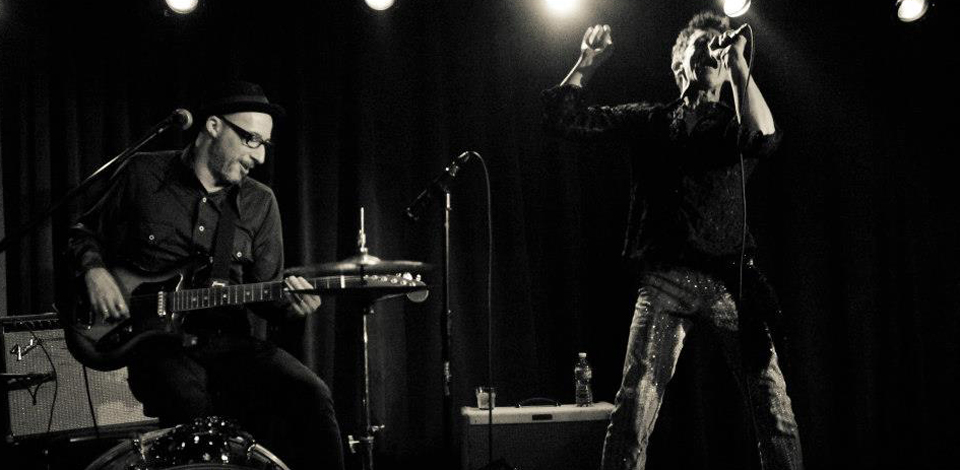
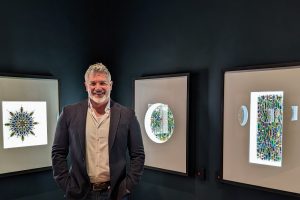
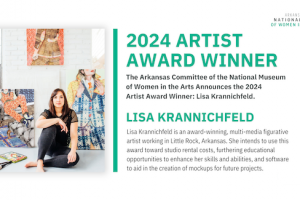
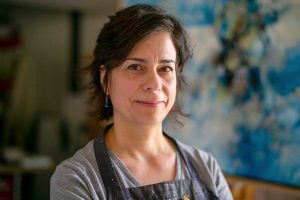
Comments